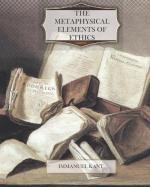For this reason, ethics may also be defined as the system of the ends of the pure practical reason. The two parts of moral philosophy are distinguished as treating respectively of ends and of duties of constraint. That ethics contains duties to the observance of which one cannot be (physically) forced by others, is merely the consequence of this, that it is a doctrine of ends, since to be forced to have ends or to set them before one’s self is a contradiction.
Now that ethics is a doctrine of virtue (doctrina officiorum virtutis) follows from the definition of virtue given above compared with the obligation, the peculiarity of which has just been shown. There is in fact no other determination of the elective will, except that to an end, which in the very notion of it implies that I cannot even physically be forced to it by the elective will of others. Another may indeed force me to do something which is not my end (but only means to the end of another), but he cannot force me to make it my own end, and yet I can have no end except of my own making. The latter supposition would be a contradiction- an act of freedom which yet at the same time would not be free. But there is no contradiction in setting before one’s self an end which is also a duty: for in this case I constrain myself, and this is quite consistent with freedom. * But how is such an end possible? That is now the question. For the possibility of the notion of the thing (viz., that it is not self-contradictory) is not enough to prove the possibility of the thing itself (the objective reality of the notion).
{Introduction ^paragraph 15}
* The less a man can be physically forced, and the more he can be morally forced (by the mere idea of duty), so much the freer he is. The man, for example, who is of sufficiently firm resolution and strong mind not to give up an enjoyment which he has resolved on, however much loss is shown as resulting therefrom, and who yet desists from his purpose unhesitatingly, though very reluctantly, when he finds that it would cause him to neglect an official duty or a sick father; this man proves his freedom in the highest degree by this very thing, that he cannot resist the voice of duty.
II. Exposition of the Notion of an End which is also a Duty
We can conceive the relation of end to duty in two ways; either starting from the end to find the maxim of the dutiful actions; or conversely, setting out from this to find the end which is also duty. jurisprudence proceeds in the former way. It is left to everyone’s free elective will what end he will choose for his action. But its maxim is determined a priori; namely, that the freedom of the agent must be consistent with the freedom of every other according to a universal law.
{Introduction ^paragraph 20}




